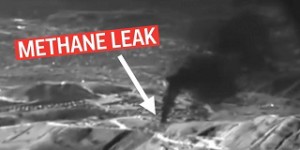 A reader suggests a video on the effect of natural gas leaks in general, and Porter Ranch, CA in particular:
A reader suggests a video on the effect of natural gas leaks in general, and Porter Ranch, CA in particular:
Here is one of the best informative video’s I have seen discussing the Porter Ranch, California gas leak. Michael Parker speaks with his guest Tim O’Conner, the Director of Environmental Defense Fund’s Oil and Gas Program in California.
While I think that the entire interview is worth a listen (there are essentially no visual aids,) at about minute 28:30 Tim discusses the effect of cumulative natural gas leaks in our national system, in essence saying that even a 1% leakage counteracts the benefit of natural gas to mitigate climate change.
This prompted me to ask energy guru Glenn Doty: If I may ask, what’s your take on this? He replied in a way I thought readers would find interesting:
Regarding the massive gas leak in Southern California… the scope of that leak is horrendous. I think the biggest problem with us as a society not trying to quantify a price on the externalities of emissions is that we don’t really have any appropriate response for this level of willful negligence.
As you know, I don’t support a tax on externality emissions, but rather a subsidy equal to the externality burden on 5 years’ worth of abated emissions on new projects… But in the case of leaks – pollution that accomplishes nothing for society – I think a direct tax is the way to go.
In a perfect world, if we had a government-set PRICE on the damages of 1 ton CO2e (let’s say a fair price might be ~$15/t-CO2e), then the power company in charge of the massive Southern California methane leak would know that they would be fined billions of dollars per day of the leak, and would direct all of their resources into plugging it, rather than just letting it leak for half a year because they didn’t want to risk damaging their infrastructure for that field.
Other externalities – including health risks for people heavily exposed to methane, and the sulfide contaminates in natural gas that are normally scrubbed out before pipeline delivery – would also be included in such a fine, and would further serve as an incentive.
This would also serve to encourage all gas companies to better maintain their pipelines. What is input is carefully metered, and what is sold to end-use customers is carefully metered… so we can know pretty closely exactly what is lost along the way, and if the gas companies were responsible for that, then they would be quite intent on reducing their leaks.
Instead, we have what we have.
I do not agree that a 1% increase in gas leakage counters the benefit in switching from coal to gas. At an average of ~40% efficiency, a thousand tons of CH4 would yield ~5.9 GWh. That would yield ~3,667 tons of CO2.
In order to get the same energy from coal, at an average efficiency of 31%, you’d have to burn an average of ~2890 tons of coal, yielding ~5900 tons of CO2.
So, if you add in another 1% methane in the equation above, you have 10 tons of CH4, which has a GWP of ~86 on a 20-year horizon and ~34 on a 100-year horizon; you get an additional ~860 t-CO2e. 3,667+860= 4527 < 5900.
Of course, it would be better without the leaks, but NG is still better than coal, and that’s before including the energy lost with mountaintop removal, pulverizing the coal, and transporting the coal. It’s also before considering the numerous contaminates and carcinogens that don’t exist in piped NG (they’re fully scrubbed) but are present and not fully scrubbed in coal exhaust.
That’s my take.
And I hope all is well.
Glenn